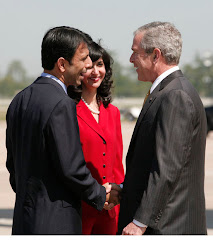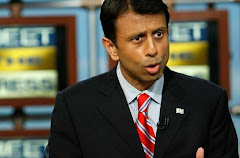Sunday, May 10, 2009
Subscribe to:
Post Comments (Atom)



With more than 12,000 employees, a $4 billion budget and hundreds of facilities, DHH is Louisiana’s largest department. Bobby was successful in turning DHH’s $400 million budget deficit he inherited into a surplus of $220 million.
In 1998, Bobby was appointed executive director of the National Bipartisan Commission on the Future of Medicare, whose recommendations continue to be the driving force behind much of the ongoing debate on how to strengthen and improve Medicare.
Bobby returned to Louisiana state government in 1999, when he became president of the University of Louisiana System - the 16th largest higher education system in the country which oversees the education of around 80,000 students a year.
In March 2001, Bobby was nominated by President George W. Bush, and later unanimously confirmed by a bipartisan vote of the U.S. Senate, as the Assistant Secretary of the U.S. Department of Health and Human Services. In that position, he served as the principal policy advisor to the Secretary of Health and Human Services.
In 2004, Bobby was elected as Congressman for the First Congressional District in Louisiana. He was re-elected to a second term in 2006.
He was sworn in as Governor of Louisiana in January 2008.





Governor Jindal continues to instill fiscal discipline and responsible use of taxpayer money. As the Governor has said, "Pork-barrel spending does not have a place in our budget, and I will veto any projects that do not meet specific criteria." Following the first regular session, Governor Jindal kept to his commitment and vetoed $16 million in non-governmental and governmental projects. Moreover, when the state faced a $341 million budget shortfall, Governor Jindal chose to make state government more lean by finding strategic costs savings in the budget, rather than making across the board cuts or passing the bill on to taxpayers.
Responding to the 2008 Hurricanes
During the 2008 storm season, Hurricanes Gustav and Ike battered all portions of the state creating tens in billions of dollars of destruction to businesses, hospitals, schools, general infrastructure, crops, and homes.
Through the aggressive pre-storm "Get a Gameplan" campaign along with the first-ever full coastal evacuation of the state, 1.9 million people were safely moved out of harm’s way, significantly minimizing loss to life and damage to property. Governor Jindal along with countless public servants and volunteers were able to quickly and effectively respond: when transportation didn't arrive to help with evacuation efforts, Governor Jindal ordered Louisiana Army National Guardsmen to drive state school busses; when ambulances were late, teams worked through the night to get support from other states to assist and evacuate the disabled and elderly; and when generators were tied up in bureaucratic red tape, Governor Jindal ordered the state to purchase generators to provide much needed power for hospitals, nursing homes, and gas stations left without power for several days.
Developing a 21st Century Workforce
Louisiana is open for business, and thousands of good jobs are available across the state, despite the national economic downturn. Comprehensive workforce development is a priority for Governor Jindal, as demonstrated by reforms that passed unanimously in the legislature in 2008. Leading the charge is the Louisiana Workforce Commission that has adopted a business approach to workforce programs and moved away from a bureaucratic system. Their efforts will complement the Fast Start Program – a source of turn-key training solutions for business – and the Workforce Training Rapid Response Fund, which combined allow for $13 million in funds dedicated to cultivating the best environment for Louisiana business. Governor Jindal recognizes that a high-quality education is the foundation for a strong workforce and has promoted career and technical education and dual enrollment to prepare our students. The governor has also partnered with the Louisiana Community and Technical College system to promote a "Day One Guarantee" for employers to provide additional training at no cost to graduates who do not demonstrate reasonable standards of performance on the job. Governor Jindal is committed to systemic transformation of Louisiana’s approach to workforce development. Initiatives must be stronger, well coordinated, and better designed to meet the needs of Louisiana’s businesses to advance economic development and the quality of life of our citizens.
Cracking Down on Crime
As the father of three young children, Governor Jindal understands the importance of keeping our children safe from violent criminals and sexual predators. As the Governor has said, “We will not tolerate the actions of those who seek to harm our children and our families,” and that is why the Governor has worked to create some of the toughest laws to target those who want to harm Louisiana children.
Following the first regular session, Governor Jindal worked to pass laws that doubled and tripled the sentences for those who hurt children – especially for those sex offenders that prey on children through the internet. Governor Jindal also led the passage of the state law that requires that the worst sexual offenders are registered for their entire lifetime.
Governor Jindal also provided additional funding for State Police in order to place 50 new troopers on the roads to protect highways and better serve Louisiana’s neighborhoods. The Governor also invested in critical infrastructure for criminal investigations, including $1.8 million for the DNA Unit and the Physical Evidence Unit, to promote more timely identification of criminals and to reduce delays in their prosecution.
Improving Health Care
After Governor Jindal’s first year in office, Louisiana’s health care system is closer than ever to implementing reforms aimed at delivering quality health services the people of Louisiana demand and deserve. As Governor Jindal pointed out, “Excuses have been used for too long, and now is the time to take action and ensure that the health of our people, not the whims of bureaucrats, is the most important thing.”
In 2008, Governor Jindal announced the launch of the “Louisiana Health First" initiative. Pending federal approval, this plan will expand health insurance coverage for many working families. Louisiana Health First puts insurance coverage back in the hands of patients and moves away from a one-size-fits-all system.
The administration has also added 11,000 uninsured children to the Louisiana Children’s Health Insurance Program, which now covers more that 646,000 children throughout the state that might not otherwise have access to care. Additionally, Louisiana has been chosen by the U.S. Department of Health and Human Services as one of the four states to take part in a national Medicare demonstration project that will assist physicians in moving toward certified electronic health records to improve the quality of patient care.
Strengthening Education
As Governor Jindal has pointed out, “Our greatest investment is our children.” In the first regular session, Governor Jindal's legislative package was a success for students, parents, and teachers. Educators were granted a pay raise of more than $1,000, keeping their salaries in line with the Southern Regional average. Duplicate, burdensome paperwork was reduced to maximize educators’ time in the classroom. Literacy and numeracy initiatives were prioritized to train school leaders, along with reading and math specialists, to better prepare students struggling with fundamental skills.
The Governor led the passage of a "Teacher's Bill of Rights,” which supports teachers in keeping their classrooms a safe learning environment for children, without destructive student behavior. Governor Jindal also led the effort to add an innovative tool for supporting education by providing $10 million in scholarships for students in the New Orleans area, which allows parents to decide what school is best-suited for their child.


No comments:
Post a Comment